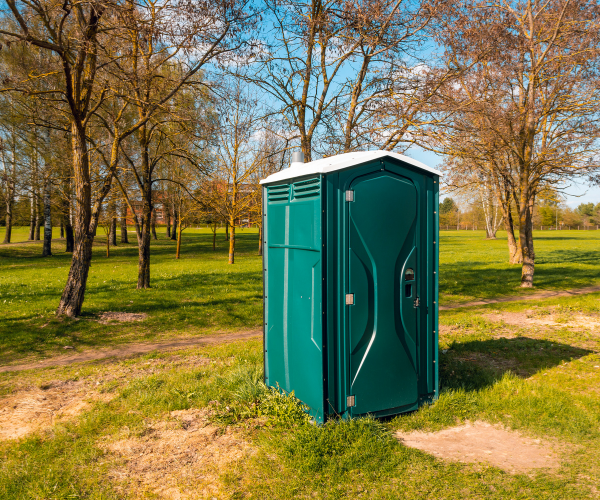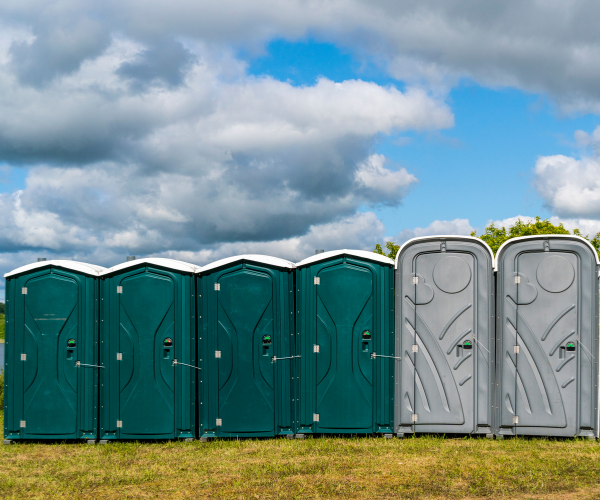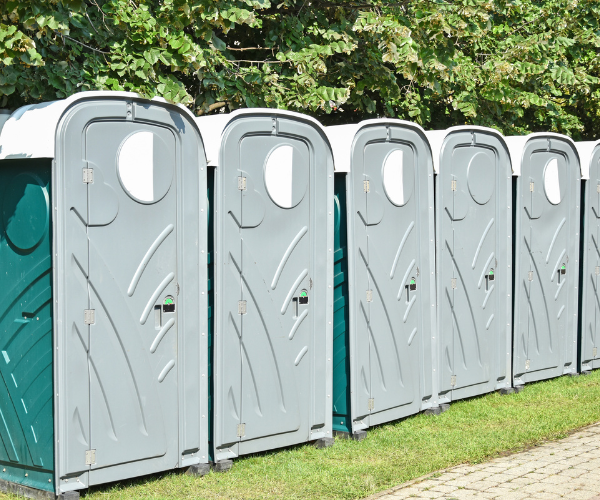Portable toilets present a range of eco-friendly advantages, making them a responsible choice for events, outdoor gatherings, and construction sites. Key among these benefits is the significant reduction of water waste. Unlike traditional toilets, which can use up to seven gallons per flush, portable toilets operate with self-contained systems, requiring minimal water use while maintaining sanitation standards. In addition, these units incorporate advanced waste management techniques that convert waste into compostable materials, resulting in less environmental impact. This process not only ensures reduced disposal frequency but also aligns with sustainable practices by minimizing carbon emissions associated with transportation and landfill contributions. Another crucial eco-friendly feature of portable toilets is their durable construction, allowing them to be reused over many events and projects. This long lifespan decreases the demand for new materials, reflecting a positive step toward sustainable resource management. Portable toilets also decrease site contamination risks by confining waste within sealed units, effectively protecting local ecosystems from runoff and pollution. Organizations seeking eco-conscious alternatives find the use of portable toilets essential, both as a public service and as a testament to their commitment to environmental responsibility. Additionally, the design flexibility of these units supports various eco-friendly initiatives. Some models integrate solar-powered lighting or utilize recyclable materials, further enhancing their green attributes. Those looking to emphasize sustainability in their event planning or construction projects can rest assured that using portable toilets can be an integral part of their eco-friendly strategy. In turn, this demonstrates a proactive approach in the ongoing effort to preserve the planet's natural resources.

Portable Toilet Rentals in Macclenny, Florida
Call today for a free quote (352) 660-8775
Portable Toilet
Fast, Easy, & 100% Free To Get Started
Over 15 Years of Experience
Our company, with over 15 years in the Macclenny area, is deeply embedded in the community. We are committed to offering top-tier service. Our unwavering focus on surpassing customer expectations distinguishes us as the go-to choice for portable toilet rentals.
Unmatched Quality Service
At Porta Serve in Macclenny, our team is committed to delivering exceptional service. We uphold rigorous standards for each Portable Toilet we provide, guaranteeing cleanliness and functionality for your event’s needs.
Fast and Reliable Delivery
Porta Serve guarantees quick and dependable delivery for all portable toilet orders in Macclenny and the surrounding areas. Our streamlined process ensures that you receive your units promptly, ready for any event or construction site.
Reliable Portable Toilet Solutions in Macclenny
Call for a Free Quote Today
(352) 660-8775
Nestled in the heart of Macclenny, our portable toilet company stands as your go-to provider for all sanitation requirements. Locally owned and operated, we excel in offering dependable and reliable services tailored to both cozy gatherings and grand events. Be it a bustling construction site, a lively festival, an intimate wedding, or a vibrant party, our units are clean, modern, and designed to enhance your event's experience. Our exceptional services extend to surrounding areas, ensuring quick delivery and seamless setup for your utmost convenience. Trust in our dedication to quality and customer satisfaction.


Standard Portable ToiletOur standard porta john rental units are durable and reliable for any commercial build site, housing development, public works project, or remodel job.Features include dome lighting, grated floors, and an “In-Use” locking mechanism for privacy and comfort.Regularly maintained, inspected, and cleaned by FusionSite at your location.

Wheelchair Accessible RestroomsDeveloped as an alternative to full ADA-compliant restrooms, the Liberty is a spacious, wheelchair-accessible unit that can also be promoted as a family-sized restroom.Includes a patented flat-floor system for easy wheelchair access and maneuverability.Handrails, paper holder, and rotary latch are designed for simple, intuitive end-user operation.

Portable SinkPortable hand washing stations are essential for keeping your work site sanitary and clean.Features hands-free foot pumps, liquid soap, and paper towels.Perfect for job sites without water hookups, these units can handle hundreds of washes between services.
We Proudly Serve
Standard Portable Toilets
Our standard portable toilets offer dependable sanitation solutions for events across Macclenny.
High Rise Portable Toilets
High rise portable toilets are tailored for elevated construction sites in Macclenny, ensuring hygiene and convenience.
Restroom Trailers
Porta Serve's restroom trailers in Macclenny combine comfort and elegance for any distinguished occasion.
Roll off Dumpsters
Porta Serve provides roll off dumpsters in Macclenny for efficient waste disposal at any project site.
Septic Tank Cleaning
Our septic tank cleaning service in Florida offers efficient maintenance to ensure operational facilities across Macclenny.
Grease Trap Cleaning
Macclenny's trusted choice for dependable grease trap cleaning, ensuring compliance and efficiency at Porta Serve.
Fencing & Barricades
Porta Serve offers comprehensive fencing and barricade solutions to secure your event spaces in Florida.
Residential Storage
Opt for accessible and secure residential storage solutions in Macclenny, perfectly suited for all your needs.
Macclenny Event & Construction Rentals
Getting a quote for our portable toilets is as convenient as it is simple. Whether hosting an outdoor event or managing a construction site, our process ensures quick and accurate information tailored to your specific needs. Visit our website anytime to begin your request. Simply fill in the necessary details, and our system will guide you through the intuitive process. Expect prompt responses from our dedicated team, ensuring that every aspect of your delivery, from timing to specific accommodations, suits your schedule perfectly. With a fleet strategically stationed for fast dispatch, our delivery logistics in Macclenny guarantee efficiency. Therefore, whether you're in the heart of the city or nearby, know that our top-quality portable toilets are just a call or click away. Requesting, scheduling, and confirming delivery is a breeze; all it takes is a few short steps to have our superior units delivered right to your site.

Nestled among Florida's natural beauty, Macclenny thrives on its local charm, inviting residents and visitors alike to enjoy its vibrant community events and scenic outdoor locations, such as Heritage Park Village or during the annual Baker County Fair. Our portable toilets complement these experiences perfectly, offering a hygienic and hassle-free solution. From bustling festivals to tranquil family picnics, we ensure that every guest's comfort is prioritized. By strategically placing our units at pivotal locations within event spaces, we optimize accessibility and convenience. As the preferred portable toilet provider in Macclenny, we deliver impeccably clean and well-maintained units suitable for any occasion. Choose us for your next event, whether it's at a local park or a family gathering, and experience the peace of mind that comes with our reliable services.
Why We're the Best Choice At Porta Serve, we are dedicated to offering portable toilet services that not only meet but exceed expectations. Our local expertise allows us to tailor services specially for the unique needs of Macclenny residents, whether for large-scale events or individual occasions. Rely on our comprehensive range of services to confidently host successful and memorable events. Our clean, modern units consistently deliver user satisfaction through innovative design and sturdy construction. Supported by our exceptional customer service and community-driven mindset, we aim to be the premier choice for all your portable toilet needs. Embrace the superior service quality that makes us the finest in Macclenny, ensuring that your guests and staff experience the best in comfort and convenience.
Fast Service You Can Trust Time is of the essence when planning events or managing construction projects. Our portable toilet services are designed to provide swift and reliable solutions, ensuring that your units arrive on time and in pristine condition. With established delivery routes covering Macclenny and its surrounding areas, we guarantee prompt service that never compromises on quality. Efficiency drives our operations, allowing us to handle last-minute requests and earlier set-ups with ease. Choose our reliable and fast solutions that accommodate any demanding schedule, affirming our promise to deliver premier experience and satisfaction.
Macclenny: Explore Our Portable Toilets
Renting a portable toilet in Macclenny is straightforward and user-friendly, designed to meet varying event and project needs efficiently. To begin, simply visit our website, where you'll find prominently displayed 'Get A Quote' buttons. These are strategically located throughout the site for your convenience. Clicking on these buttons will guide you to the necessary online form. Here, you'll be prompted to enter basic details such as your first name, last name, phone number, and email address. Once the form is completed, submit your request to receive a customized quote. Our team acts swiftly to review your requirements and provide a competitive quote tailored to your budget and needs. Our service team is available to clarify any additional queries, ensuring that you feel confident in the equipment specifications and delivery schedule. We also offer flexible rental arrangements, accommodating one-time events to extended project sites, ensuring that each unit is seamlessly integrated into your logistical plans. This seamless process underscores our commitment to customer satisfaction. You can trust that our hassle-free booking system empowers you to focus on planning the best event or maintaining efficient operations at your construction site. Let us manage the details of your portable toilet needs while you enjoy hassle-free convenience by simply utilizing our easy online request forms.
The delivery timeframe for portable toilet orders varies based on location specifics and the number of units requested. Typically, we aim to fulfill orders within 24 to 48 hours for clients within the Macclenny area. Our proactive logistics team routinely coordinates deliveries to ensure prompt and efficient service, even accommodating same-day requests where possible. This swift turnaround is achievable due to our strategically positioned inventory across regional hubs, poised for rapid deployment. Clients outside the immediate radius or with substantial booking requests might experience marginally extended delivery times. However, our team is adept at managing complex scheduling scenarios, maintaining a focus on meeting your timelines consistently. Whether staging a festival or preparing for a construction milestone, you can rely on our precise schedule-keeping to deliver units at your convenience. With over 15 years of industry experience, we've refined our service to prioritize client satisfaction and operational transparency. Upon confirming your order, our detailed communication ensures that you're kept informed every step of the way, from dispatch to onsite installation. This adherence to impeccable service standards means that delivery timelines might differ depending on specific client needs, site accessibility, seasonal demand, or challenging logistics. However, our customer-oriented approach takes these factors into account, offering practical solutions to suit each distinctive requirement. Moreover, continued investment in modern transport fleets enhances our capability to navigate varying terrains efficiently, promising reliable, eco-friendly, and punctual deliveries without compromising on unit quality. For the most accurate delivery estimates related to your upcoming event or construction demands, reach out to our customer care advisers who are ready to assist with precision scheduling and any pertinent clarifications. Our goal remains unwavering—an unparalleled service commitment that delivers portable toilets promptly, directly to your designated location, whenever you need them.
Absolutely! Whatever the nature of your event or construction endeavor, we have the capacity to accommodate it with our wide-ranging portable sanitation solutions. Our diverse offerings include standard porta potties, ADA units, luxury restroom trailers, and everything in between, ensuring that each guest or worker enjoys premier hygiene facilities. From festive community engagements such as festivals, concerts, and sporting competitions, to high-profile weddings, corporate gatherings, and family reunions—our adaptable units provide the essential conveniences to elevate any occasion. For construction sector needs, we additionally supply roll-off dumpsters, portable sinks, hand sanitizer stations, fencing, and barricades to complete your site's operational needs. We take pride in our ability to scale services according to your specific project or event requirements. Whether facilitating long-term projects or supporting single-day activities, rely on our professional expertise to enhance your planning and outcome success. The fusion of our extensive inventory network and skilled service team means that clients are assured of hassle-free setups. Prompt disposal maintenance retains exemplary sanitation standards, reinforcing our reputation for reliability and quality. For bespoke service customization and further details regarding our extensive product lineup and availability for your venue or project, we invite you to connect with our knowledgeable representatives. They will guide you every step of the way, from product selection to final deployment, confirming a seamless Porta Serve experience tailored to your distinctive needs.

